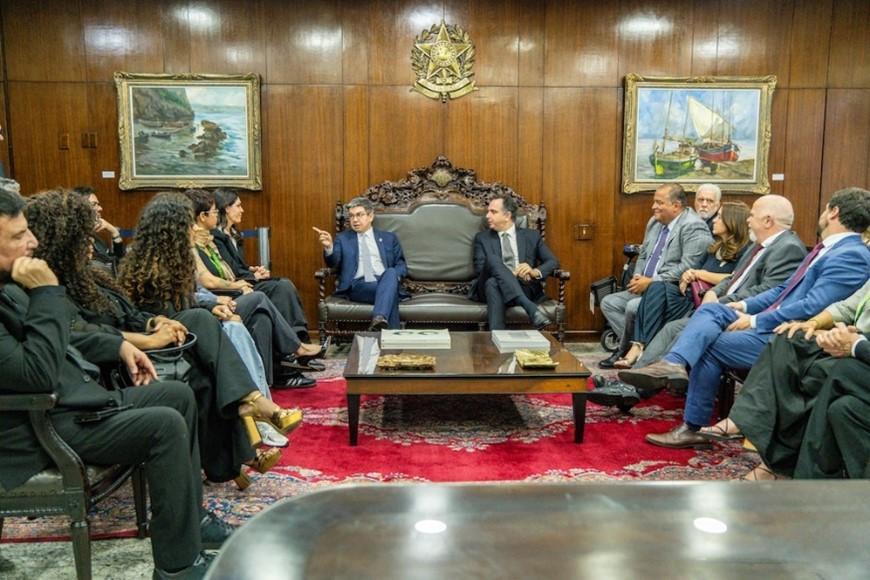Creators Celebrate Brazil's Senate Approval of AI Bill but Prepare for Tougher Battle in the Lower House

The proposed law is hailed as a global benchmark for copyright protections, say legal experts and creators involved in its development.
RIO DE JANEIRO, December 11, 2024 – Brazil's Senate plenary voted on and approved Bill 2,338/2023, widely known as the AI Bill, on Tuesday (10). The move has been met with widespread approval from the country's creative community. At the heart of this celebration lies the bill's extensive chapter on copyright protections, which stands out amidst numerous provisions regulating the use and commercial limits of artificial intelligence across the nation.
This is the same text recently passed by a special committee on the topic. Key provisions include:
AI software developers must disclose which copyright-protected materials were used to train their systems;
A regulatory body for AI will be established in Brazil, featuring an experimental platform where developers can negotiate payments with creators whose works are used in training their models;
Creators will have the right to prohibit their works from being used for AI training. Alternatively, they may authorize usage through direct contracts with AI companies or via collective management organizations such as UBC and others;
Remuneration for creators will consider the size of the AI company, the frequency of use of protected materials in machine-generated content, and the potential competition these AI-generated outputs might pose to human creators.
These points were hotly debated over recent months during special committee sessions, many attended by prominent creators from various fields, including acclaimed Brazilian musicians Marisa Monte and Roberto Frejat. The creative community has actively advocated for retaining copyright provisions in the bill through open letters to senators and public campaigns. Marisa Monte was among the first to respond to the Senate's approval.
"With the passage of the AI Regulatory Framework (Bill 2338/2023), the Brazilian Senate has positioned Brazil at the forefront of the global debate. This is a significant step forward for protecting copyrights and Brazilian intellectual production. There is still much work ahead in the Chamber of Deputies (Brazilian Lower House), but the Senate has set an example and fulfilled its role in defending Brazilians' fundamental rights," she told UBC.
Advocacy groups such as Procure Saber, led by producer Paula Lavigne, and a delegation from UBC headed by its president Paula Lima and CEO Marcelo Castello Branco, were in the Senate on Tuesday. They held meetings with various lawmakers, including Senators Rodrigo Pacheco (Minas Gerais State), Eduardo Gomes (Tocantins State), and Randolfe Rodrigues (Amapá State), to emphasize the cultural creators' stance: disruptive technologies should not use protected materials without prior authorization and/or financial compensation for their original authors.
The UBC delegation, which included members like Michael Sullivan, Otto, Marina Sena, Paula Fernandes, Kell Smith, Renno Poeta, and Diego Barão, participated in discussions and closely followed the plenary vote.
©Daniel Bueno
"No one here is fighting against artificial intelligence. We understand it as a technology that also brings progress," said Marina Sena at a press conference attended by the united creative community. "But we believe that if companies are profiting billions from this, they must take responsibility and compensate us for the data mining of our work and lives – not just ours but that of the entire Brazilian population."
©Daniel Bueno
For Sydney Sanches, a copyright expert, president of the Brazilian Bar Institute (IAB), and legal advisor to UBC, the bill "ensures innovation while safeguarding the free flow of ideas and freedom of expression."
"The text preserves creators' and artists' rights in a globally pioneering format, guaranteeing the exercise of copyright, transparency, image and voice protection, and fair remuneration. It's a regulatory framework that will serve as an international benchmark, strengthening democracy and human dignity," Sanches said. He praised the personal involvement of Senator Pacheco, the protection of the robust copyright chapter by Senator Gomes, and the contributions of Senator Rodrigues and Marcos Alves de Souza, Brazil's Secretary of Copyright.
Although the tone was celebratory, concerns linger over the bill's future in the Chamber of Deputies, where competing interests might undermine copyright protections. Castello Branco described Tuesday's vote as just the first step.
©Daniel Bueno
"This victory in the Senate, though partial, marks the beginning of a responsible, modern regulatory framework that prioritizes transparency, fair compensation, and respect for creators' choices when they do not authorize the use of their protected works in the 'wild west' of AI," he said. "Now, we must thank everyone involved in this endeavor – artists, authors, legal experts, producers, and politicians – who crafted a text that, in many ways, positions Brazil as a leader on this issue, not a passive observer."
Despite its groundbreaking nature, the bill leaves some questions unanswered, such as how to measure the financial harm caused to creators by competition with generative AI or how the future regulatory body will mediate negotiations between big techs and human creators. Still, the Senate-approved bill goes further than Europe's own AI legislation, passed earlier this year but yet to be implemented by member states.
Companies that fail to comply with Brazil's forthcoming regulations could face hefty fines – up to 50 million réais or 2% of their revenue, depending on the severity of the violation.
In Brasília, there's no clear timeline for the bill's passage in the Lower House, likely starting next year. If approved, it will be sent to President Luiz Inácio Lula da Silva for enactment. Most provisions would take effect 730 days (two years) after publication, but rules on generative and general-purpose AI systems, prohibited applications, and copyright protections are set to come into force 180 days after the law's publication.